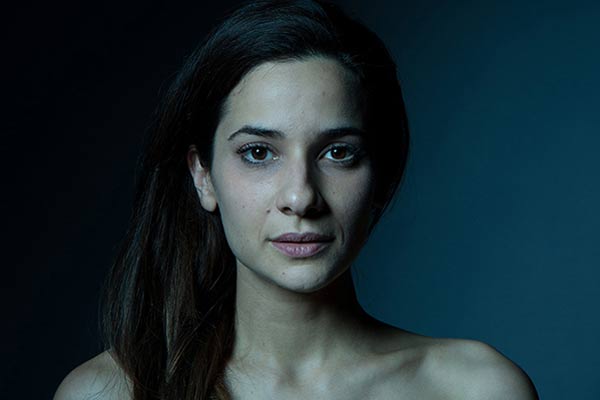Australian actress Andrea Demetriades returns to the stage to take on the lead role in the Sport For Jove take of the classic Greek play ‘Antigone’.
The sign of a strong actor is when they’re interested in the role they are playing. When they are, the audience becomes interested and is drawn into the role even further. Andrea Demetriades’ interest in the world around her is deep, even to the point where it became like she was the interviewer – answering questions by asking opinions on politics and culture.
Andrea has made a name for herself by portraying thought-provoking roles. Having grown up in a Greek family, her experiences have given her the depth to portray women of different cultures on stage and screen, such as Muslims Lina Badir in ‘Crownies’ and ‘Janet King’, and Eve in the film ‘Alex And Eve’. It’s only right someone with such a profound interest in people should play a character as challenging as that of Antigone (pronounced An-tig-o-nee) in the play of the same name.
The story of Antigone is one of many enduring tales from Greek mythology of honour, bravery and integrity. Unlike, say, ‘The Iliad', ‘Antigone’ is more concerned with the aftermath of grand and bloody battle, lifeless bodies strewn across fields, and kings deciding what to do with their captives.
Antigone, daughter/sister of Oedipus, wants to secure a respectable burial for her brother Polynices. However, their uncle King Creon has declared no one to mourn or bury Polynices for his crimes, or else they will be put to death themselves. In defiance, Antigone seeks to give her brother a burial out of love for her family.
The play, written by the Ancient Greek playwright Sophocles, is a challenging piece of text, but Andrea thrives on challenges. “She’s a lot tougher than me,” Andrea says. “She’s tough and ballsy, but she’s also got vanity attached to her. I find that intriguing – that little bit of narcissism in her. She’s completely flawed. But, a good character should always be flawed. It’s human to be flawed.”
Growing up in Perth as the youngest in a family of Greek-Cypriot immigrants would make one think Andrea grew up with this story, but she was never taught it. It’s her empathy and interest in people and cultures, which she developed from her family, which led her to ‘Antigone’. This interest has even led to her seeing parallels between the play and current society.
“Burial is still important. We forget we go to funerals: to honour the dead, and to say goodbye. And it’s not just for the dead, but it’s also for us. If we want to move on, we need to bury the things that have happened. I find that fascinating and totally relevant.
There was a production in 2014 in Syria, and they got all these women who’ve got brothers and sons who have fought and died for ISIS. It was only when they could find and bury them that they could move on. The idea these women love their family so much that they are willing to die to bury them, I find that extraordinary.”
‘Antigone’ plays at the Seymour Centre's Reginald Theatre 6-22 October.

